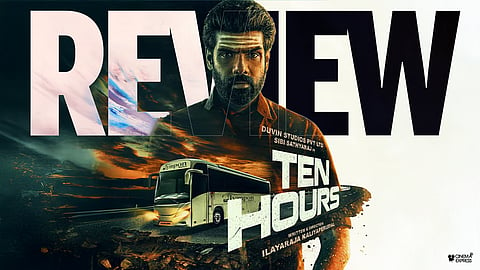

The biggest advantage of a time-bound murder mystery is that even if it has shallow characters and meanders occasionally, all will be forgiven if the end reveal is satisfactory. Debut director Ilayaraja Kaliyaperumal's Ten Hours is the opposite. The film is brilliant as it steadily remains on course but it's a hit-and-miss with the climax. Ten Hours begins with Athur Inspector Castro (Sibi Sathyaraj) struggling to solve a case because he has hit the wall in the investigation. The constable, played by actor Gajaraj, reminds Castro of his strengths by pointing to his older cases. The narrative then shifts to ten hours earlier, where the crime is initially reported at the police station. Castro suspects that the case of a missing girl and a murder on a running bus are somehow connected. Whether he is able to substantiate his theory and catch the guilty forms the central thread of Ten Hours.
Sibi looks comfortable in the skin of Castro, who doesn't hesitate to deliver justice, either through legal means or otherwise. Apart from the protagonist, none of the other characters are exceptional enough to stand out, though thankfully, no one ruins the film either. With little to look forward to on the performance front, the film holds our attention through its plot. However, the story is reminiscent of films like Murder on the Orient Express, which also centres on a murder in a moving vehicle with multiple suspects. Unlike other films of this genre, Ten Hours never resorts to red herrings to make us suspect multiple characters. There are no layers, nuance or mystery about any of the characters. On the contrary, every suspect accepts that they wanted to murder this person, and curiously, the victim's actions towards them aren't grave enough to deserve the meticulous plotting to eliminate him. For instance, one of the suspects wants to avenge his workplace embarrassment, which is the victim thrashing him for inappropriately filming his girlfriend in the loo of a restaurant. Even if you overlook the suspect's unusual motivation to want to murder the victim, why did it have to happen inside a bus? It is unclear why a bus is the perfect place for this calculated murder to take place. Getting all the suspects to huddle inside a fifty-seater bus feels like a mockery of our senses. The idea of baffling the protagonist with multiple weapons in the murder scene is clever. However, it falters in execution.
Director: Ilayaraja Kaliyaperumal
Cast: Sibi Sathyaraj, Gajaraj, Raj Ayyappa, Saravana Subbiah, Dileepan
Where Ten Hours works is the gradual building of our anticipation towards knowing how the murder took place and how it is tied to the missing case. Thankfully, the makers answer that question without desperately trying to splice the two seemingly dissimilar cases. Even though Sibi's Castro can use brute force when required and looks unstoppable on the surface, he remains on the back foot for most of the first half. The film doesn't fall into the 'supercop' trap and amply humanises Castro as he regularly stumbles while inching closer to the root of the crime. The second half is as racy as the first half, without a moment of deviation. Towards the end, we could guess who was guilty of the crime. But kudos to the makers for coming up with a novel idea for the motive of the crime. It might sound pedantic but the final 'big reveal' seems far-fetched for the kind of tonality that Ten Hours is going for. It is easy to overlook this issue since the film maintains an unbridled focus on the primary plot point, gradually increasing tension whenever Castro hits a roadblock.
To sum it up, Ten Hours is a taut whodunnit thriller that could have been more if only the suspects had convincing motives. Having said that, it would be unjust to put down a film that has dared to avoid inane subplots, a convenient writing choice common to films of this genre. Debutant Ilayaraja's watertight screenplay and Sibi's adequate shouldering and thrills at regular intervals make Ten Hours a winner.